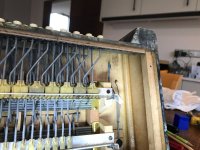Ignacchitti
Active member
Any info on the quality of the aluminum/steel used in accordion mechanics and other parts? In terms of corrosion resistance and strength.
I know of accordion models that used to include anodized materials in the bass mechanics in the past (50 years ago) and that nowadays are no longer treated. Chromed mechanics, I believe, are also not so common anymore.
Besides cost cutting, could these moves reflect a tendency of manufacturers to use better aluminum/steel to begin with? Or is it simply shoddy work?
I know of accordion models that used to include anodized materials in the bass mechanics in the past (50 years ago) and that nowadays are no longer treated. Chromed mechanics, I believe, are also not so common anymore.
Besides cost cutting, could these moves reflect a tendency of manufacturers to use better aluminum/steel to begin with? Or is it simply shoddy work?

